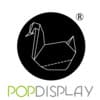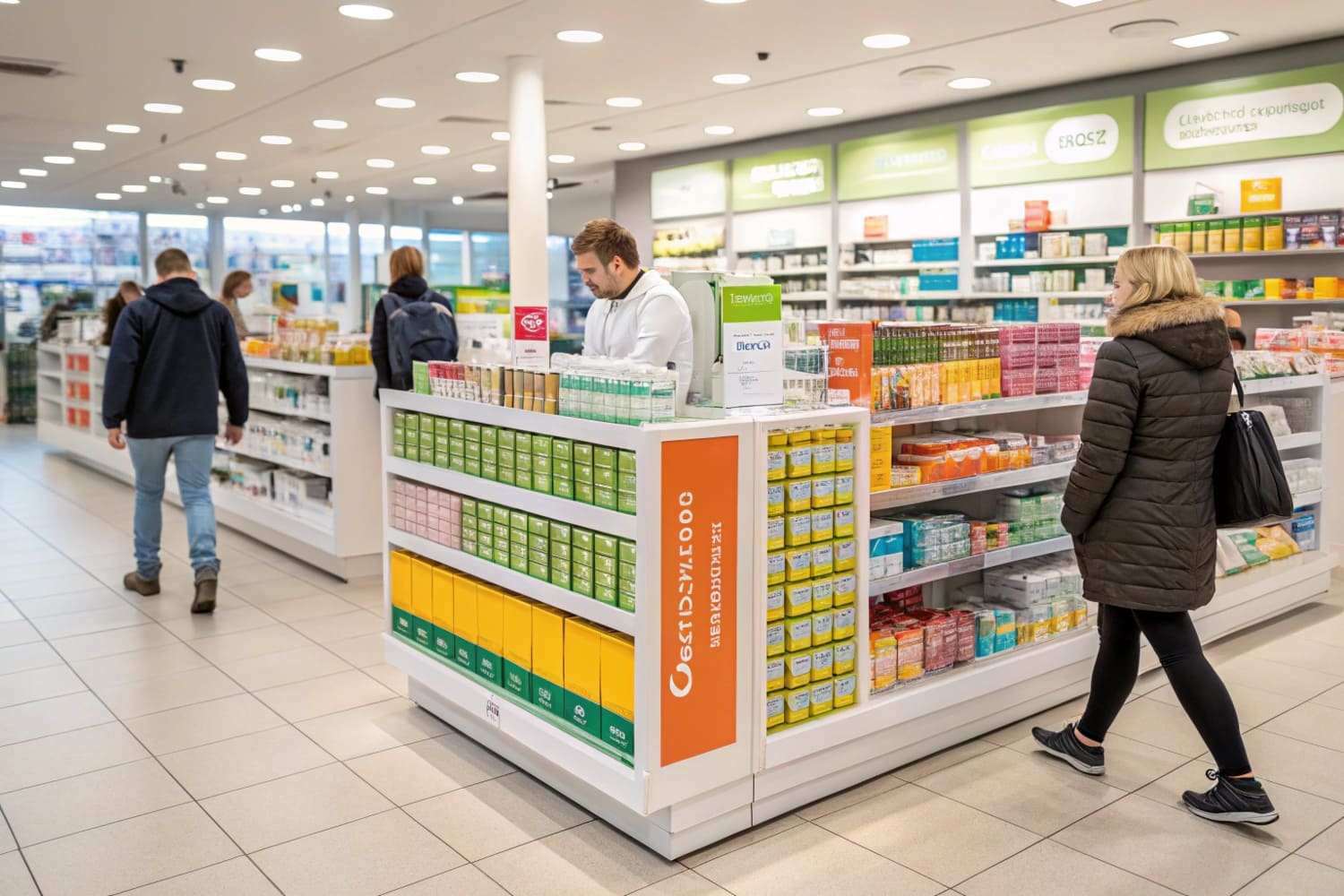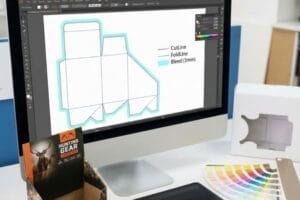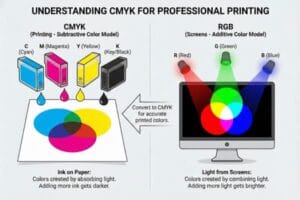Pharmacy aisles feel crowded. Shoppers rush. Budgets stay tight. I use simple cardboard displays to guide eyes, lift baskets, and keep costs low. Here is what works and why.
OTC pain relief, cough and cold, vitamins and supplements, beauty and skincare, oral care, seasonal wellness, travel-size essentials, baby care, first aid, and low-risk devices convert best on floor, pallet, shelf trays, and counter displays near the pharmacy counter and high-traffic endcaps.
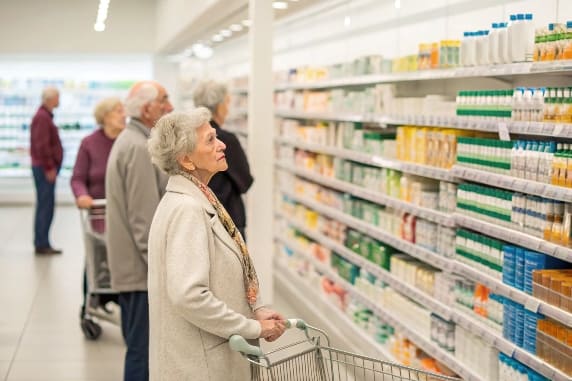
I run PopDisplay in Shenzhen with three production lines. My team designs, prototypes, tests, and then produces. We focus on load strength, clean print, and fast setup. The same simple rules that help my factory floor also help your sales floor. Let us walk the store together.
How to merchandise a pharmacy?
Most pharmacies fight clutter and slow turns. I start with the shopper path, then map touchpoints. I align display type, product role, and season so every square foot sells.
Use a simple plan: define traffic flow, place endcap floor displays for seasonal OTC, keep counter trays for impulse, block categories by need-state, restock daily, and measure sales per facing to adjust weekly.
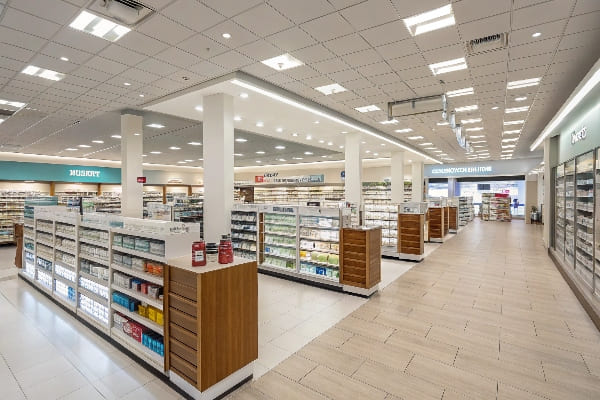
Start with the path
I trace how customers enter, where they pause, and where they ask for help. The first pause point gets a seasonal floor display1. The pharmacy counter gets small trays for impulse, like lip balm and travel pain relief. I keep sight lines clear. I avoid tall walls at the front. I block items by need, not by brand. I group “pain and fever,” “cold and flu,” “digestion,” “sleep,” and “immunity.” I mirror this logic on displays. I stock deep on top items and use clean headers with one claim. I print big numbers for dosage or count, not just brand. I change cards weekly if the season shifts. I watch sales per facing and restock before gaps show. This keeps trust high and returns low.
Match display to job
| Display Type | Best Use Case | Why It Works in Pharmacy | Setup Tip |
|---|---|---|---|
| Floor (endcap) | Seasonal OTC, vitamins, promos | High visibility and fast decisions2 | Use bold header and simple claim |
| Countertop tray | Impulse and travel size3 | Short dwell time, quick grab | Keep under five SKUs |
| Shelf tray | Core line extensions | Organizes small packs | Add color blocks for clarity |
| Pallet (PDQ) | High-volume promos | Easy in, easy out | Pre-pack by store cluster |
What products do pharmacies sell?
Pharmacies do more than prescriptions. I group products by need so shoppers find them fast. This also guides which display format wins.
Core lines include OTC medicines, vitamins, first aid, oral care, beauty, personal care, baby care, seasonal wellness, devices like thermometers, and convenience items. Prioritize high-margin, high-velocity SKUs on displays that sit in traffic and near advice points.
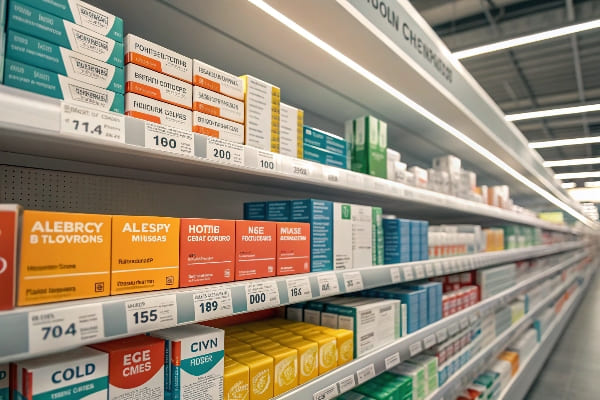
Group by need, then assign the right display
I start with the jobs shoppers want done. Relief, protection, energy, sleep, hygiene, baby care, and beauty. I place high-need, quick-decision items4 closer to the pharmacy window and pay counter. I move slower, comparison-heavy items to shelf trays with clear price ladders. I give vitamins and supplements5 a floor display during cold and flu peaks, then shift to allergy and hydration in spring. I use small devices like thermometers and pulse oximeters on secure counter trays with clear features. I keep first aid near sports wraps or shoe insoles to drive add-ons. I avoid mixing clinical packs with beauty unless the claim links them.
Category map and display fit
| Category | Shopper Trigger | Best Display | Cross-Sell | Margin Signal |
|---|---|---|---|---|
| Pain & Fever6 | Sudden need | Counter tray / shelf tray | Heat patches | Multi-pack price card |
| Cold & Flu | Seasonal spike | Floor endcap | Tissues, lozenges | Bundle sign “Relief kit” |
| Vitamins & Immunity7 | Prevention | Floor / shelf tray | Probiotics | Clear daily dosage |
| Oral Care | Habit | Shelf tray | Floss, mouthwash | “Whitening + sensitivity” block |
| First Aid | Accident | Shelf tray | Antiseptic, bandages | “Family pack” badge |
| Beauty & Skincare | Self-care | Shelf tray | SPF, lip care | Shade finder card |
| Baby Care | Routine | Shelf tray | Wipes, rash cream | “Gentle formula” tag |
| Devices | Monitoring | Counter tray | Batteries | Simple spec icon row |
What is the importance of merchandising in general or pharmacy merchandising?
Good merchandising makes choice easy and builds trust. In healthcare, clarity reduces risk. I treat every display as a silent helper at the shelf.
Effective pharmacy merchandising lifts conversion, basket size, and satisfaction by guiding choices, signaling safety, and speeding trips. Clear displays, simple claims, and ethical prompts create repeat visits and protect brand credibility.
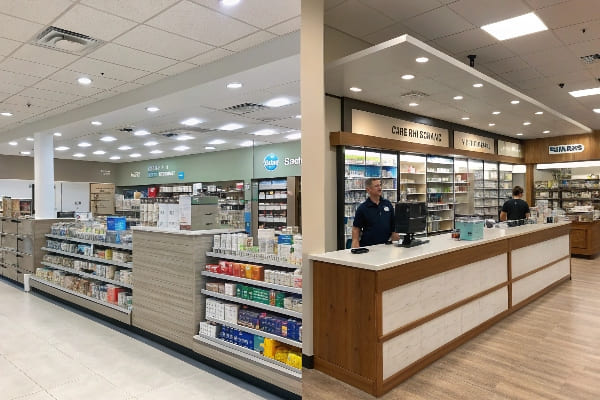
Business impact you can measure
I measure sales per facing8, units per transaction, and out-of-stock minutes. I also watch returns and reviews. Floor POP displays often drive the fastest lifts because they stop traffic. Counter trays add low-friction items to baskets. Shelf trays reduce search time and cut walkaways. Cardboard helps because it is fast to print, easy to ship flat, and quick to set up. Digital printing lets me run small batches by store cluster without waste. Recycled boards and water-based inks support sustainability goals9 and brand image. This matters in health retail where trust is the currency.
Why cardboard is a strong choice
| Benefit | What It Means | Why It Matters in Pharmacy |
|---|---|---|
| Cost-effective10 | Lower unit and freight cost | More seasonal refreshes without overspend |
| Flexible & custom | Cut, fold, print fast | Fit tight aisles and unique SKUs |
| Fast turnaround | Quick design-to-store | Catch flu peaks and local events |
| Sustainable11 | Recyclable materials, water inks | Supports shopper values and compliance |
Execution rules that protect trust
I keep messages simple. One benefit, one proof, one action. I use large type for strength, dosage, or count. I avoid claims that sound like diagnosis. I print QR codes that open usage guides12, not hard sells. I add load and transport tests13 at our PopDisplay lab to make sure a stand holds the weight through shipping. I document materials and certifications to avoid any doubt in audits. I use color to sort need-states, not to shout. This balance lifts sales and keeps the brand safe.
How to make your pharmacy stand out?
Shoppers remember simple stories. I use one promise per zone and one hero product per display. This beats noisy aisles and keeps trust.
Own a need-state, use sustainable displays, tie in local health moments, and add quick advice. Combine bold floor displays with clean counter trays and QR help. Keep stock perfect and signage honest.
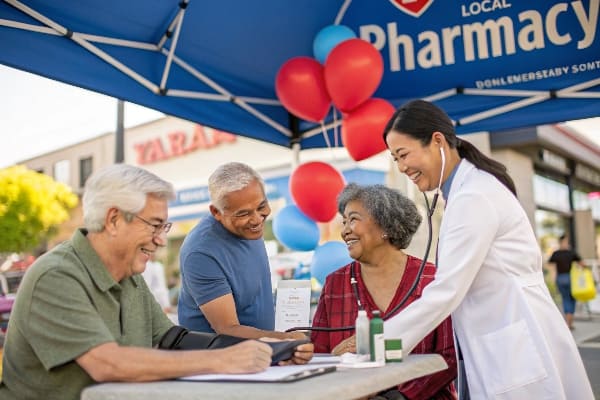
Build a clear promise and prove it in-store
I pick one promise per zone: “Breathe Better14,” “Soothe Pain Fast15,” or “Daily Energy.” I choose a hero SKU and support it with two helpful add-ons. I use a cardboard floor stand with a clean header and a short checklist. I add a counter tray by the pharmacist for impulse add-ons. I link a QR code to a short, plain-language guide that my team can host. I keep all claims simple and sourced. I do not overstate health outcomes. I switch the story with the season and with local events. This rhythm keeps the store fresh and familiar.
Differentiation playbook
| Tactic | How to Do It | Tools I Use |
|---|---|---|
| Need-state zones16 | Name each zone by job | Large headers, color blocks |
| Seasonal sprints | Rotate every 4–6 weeks | Fast digital print, flat-pack kits |
| Sustainable look17 | Recycled board and water inks | Material spec on header |
| Fast advice | QR to usage and safety | Short videos, one-pagers |
| Zero-gap stocking | Daily face-up routine | Simple checklist card |
| Proof of quality | Strength and ship tests | Lab photos, load labels |
A short story from my floor
A regional chain asked for a cough and cold reset. We built a recycled-board endcap18 with one message: “Feel Better Sooner19.” We stocked top syrup, lozenges, and a humidifier add-on. We kept claims simple and added a QR for dosing tips. We shipped flat packs that one person could set up in minutes. We tested each stand for load and transport in our lab first. The chain reported faster sell-through and fewer confused questions at the counter. The team kept the kit up through the peak, then we rolled to allergy with new headers on the same frame. Cost stayed low, setup stayed fast, and trust stayed high.
Conclusion
Pharmacy displays win with simple stories, right products, and clean setup. Place them in traffic, track results weekly, and refresh with fast, sustainable cardboard that works hard and costs less.
Explore how seasonal floor displays can enhance customer engagement and boost sales in retail environments. ↩
Understanding the impact of visibility can enhance your pharmacy’s promotional strategies. ↩
Exploring impulse buying can help you optimize product placement and increase sales. ↩
Understanding these items can enhance your retail strategy, ensuring you meet customer needs effectively. ↩
Exploring this topic can help you understand the importance of these products and how to market them effectively. ↩
Explore this link to discover innovative display strategies that can enhance visibility and sales for Pain & Fever products. ↩
This resource offers insights into marketing strategies that can boost the appeal and sales of Vitamins & Immunity products. ↩
Understanding sales per facing can help optimize product placement and increase revenue. ↩
Exploring sustainability strategies can enhance brand image and customer trust, crucial in today’s market. ↩
Understanding cost-effective packaging can help pharmacies optimize their budgets while enhancing seasonal offerings. ↩
Exploring sustainable packaging practices can align pharmacies with eco-friendly values and improve compliance. ↩
Explore this link to discover how usage guides can enhance customer understanding and trust in your products. ↩
Learn about the significance of load and transport tests to ensure product safety and reliability during shipping. ↩
Explore this link to discover innovative marketing strategies that can enhance your product visibility and customer engagement. ↩
This resource offers insights into effective pain relief solutions and marketing tactics to attract more customers. ↩
Understanding need-state zones can enhance your marketing strategy by targeting specific customer needs effectively. ↩
Exploring sustainable design practices can help you reduce environmental impact while appealing to eco-conscious consumers. ↩
Learn how using recycled materials in retail displays can boost sustainability and attract eco-conscious customers. ↩
Explore this link to discover innovative marketing strategies that can enhance your health product’s visibility and sales. ↩
